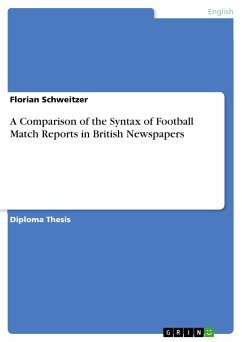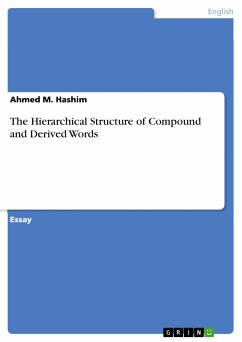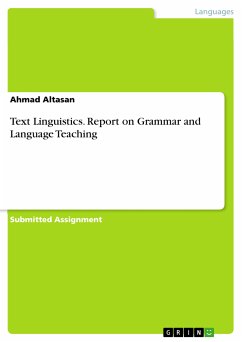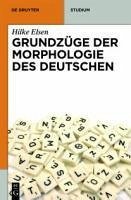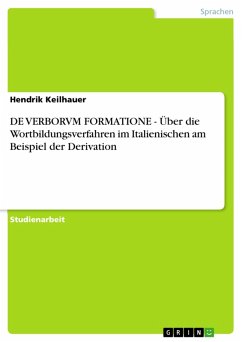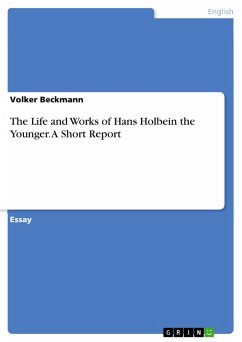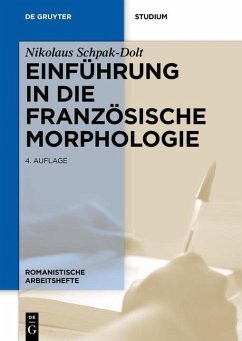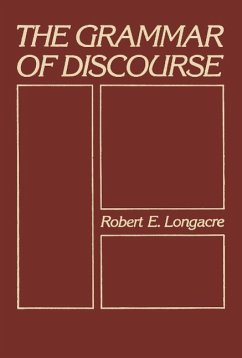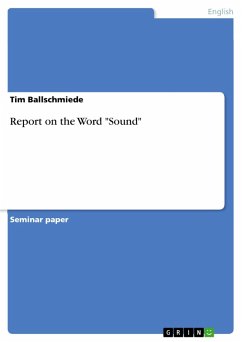
Report on the Word "Sound" (eBook, PDF)

PAYBACK Punkte
0 °P sammeln!
Seminar paper from the year 2015 in the subject English Language and Literature Studies - Linguistics, grade: 1,0, University of Birmingham (School of English), course: Grammar & Vocabulary, language: English, abstract: Bei der vorliegenden Arbeit handelt es sich um einen linguistischen Report, den ich während meines Auslandsaufenthaltes an der Birmingham City University verfasst habe. Dabei wurden grundlegende linguistische Phänomene anhand eines Wortes ("sound") wie bspw. Morphologie oder Syntax untersucht. Der erste Teil der Arbeit beschäftigt sich mit der Wortherkunft (Etymologie) sowie...
Seminar paper from the year 2015 in the subject English Language and Literature Studies - Linguistics, grade: 1,0, University of Birmingham (School of English), course: Grammar & Vocabulary, language: English, abstract: Bei der vorliegenden Arbeit handelt es sich um einen linguistischen Report, den ich während meines Auslandsaufenthaltes an der Birmingham City University verfasst habe. Dabei wurden grundlegende linguistische Phänomene anhand eines Wortes ("sound") wie bspw. Morphologie oder Syntax untersucht. Der erste Teil der Arbeit beschäftigt sich mit der Wortherkunft (Etymologie) sowie den verschiedenen Bedeutungen und Flexiven. Aufbauend auf diese grundlegenden Informationen untersucht der zweite Teil die unterschiedliche Flexive im Bezug auf ihre benachbarten Wörter (Kollokationen). Mit Hilfe des British National Corpus werden sowohl mehrere Beispiele herausgestellt als auch Diagramme und Tabellen verwendet, um die Ergebnisse hervorzuheben. Das kurze Fazit stellt noch einmal die wichtigsten Punkte zusammen. Nachfolgend die Einleitung aus der Arbeit: The following report is dedicated to investigate the word "sound" (/sänd/) with regards to some of the main linguistic features: meaning, morphology, syntax, collocation. First of all, this brief introduction will look at the word in its common meaning as well as its etymology. If one hears the word sound, one will automatically associate it with noise. According to the Oxford Dictionary of English sound relating to noise has its origin in two other languages: Anglo-Norman French and Latin. The former includes the noun soun and the verb suner, the latter the noun sonus. The word entered the English language for the first time in the Middle English period. At that time it was written soun like the Anglo-Norman French version and the -d was added in the Early Modern English period (Oxforddictionaries.com, 2014). The next section will present other main senses of the word as well as their etymology (meaning). Afterwards, the section on morphology will focus on the word classes and inflec- tions of the word "sound" (morphology). Based on these introductory sections, the analysis of this report will be examined with the help of the British National Corpus in the last two sec- tions. Therefore, it will be outlined how the word operates in English syntax as well as the regular lexical phrases it enters. Ultimately, the conclusion will discuss the results that have been discovered in the analysis.
Dieser Download kann aus rechtlichen Gründen nur mit Rechnungsadresse in A, B, BG, CY, CZ, D, DK, EW, E, FIN, F, GR, HR, H, IRL, I, LT, L, LR, M, NL, PL, P, R, S, SLO, SK ausgeliefert werden.




